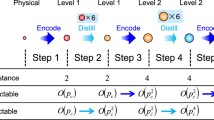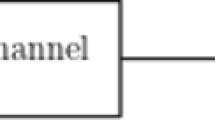Abstract
We present a method of concatenated quantum error correction in which improved classical processing is used with existing quantum codes and fault-tolerant circuits to more reliably correct errors. Rather than correcting each level of a concatenated code independently, our method uses information about the likelihood of errors having occurred at lower levels to maximize the probability of correctly interpreting error syndromes. Results of simulations of our method applied to the [[4,1,2]] subsystem code indicate that it can correct a number of discrete errors up to half of the distance of the concatenated code, which is optimal.
Similar content being viewed by others
References
Kitaev A.: Fault-tolerant quantum computation by anyons. Ann. Phys. 303, 2 (2003)
Raussendorf R., Harrington J., Goyal K.: Topological fault-tolerance in cluster state quantum computation. New J. Phys. 9, 199 (2007)
Knill, E., Laflamme, R.: Concatenated quantum codes. arXiv:quant-ph/9608012 (1996)
Shor, P.: Scheme for reducing decoherence in quantum computer memory. Phys. Rev. A 52: 2493(R) (1995)
Steane A.M.: Active stabilization, quantum computation, and quantum state synthesis. Phys. Rev. Lett. 78, 2252 (1997)
Nielsen M.A., Chuang I.L.: Quantum Computation and Quantum Information. Cambridge University Press, Cambridge (2000)
Aharonov D., Ben-Or M.: Fault-tolerant quantum computation with constant error. Proc. ACM Symp. Theory Comput. 29, 176 (1998)
Aharonov, D., Ben-Or, M.: Fault-tolerant quantum computation with constant error rate. arXiv:quant-ph/9906129 (1999)
Knill E., Laflamme R., Zurek W.: Resilient quantum computation: error models and thresholds. Proc. R. Soc. Lond. A 454, 365 (1998)
Preskill J.: Reliable quantum computers. Proc. R. Soc. Lond. A 454, 385 (1998)
Aliferis P., Gottesman D., Preskill J.: Quantum accuracy threshold for concatenated distance-3 codes. Quantum Inf. Comput. 6, 97 (2006)
Poulin D.: Optimal and efficient decoding of concatenated quantum block codes. Phys. Rev. A 74, 052333 (2006)
Evans Z.W.E., Stephens A.M.: Message passing in fault tolerant quantum error correction. Phys. Rev. A 78, 062317 (2008)
Calderbank A.R., Shor P.W.: Good quantum error-correcting codes exist. Phys. Rev. A 54, 1098 (1996)
Steane A.: Multiple-particle interference and quantum error correction. Proc. R. Soc. Lond. 452, 2551 (1996)
Bacon D.: Operator quantum error correcting subsystems for self-correcting quantum memories. Phys. Rev. A 73, 012340 (2006)
Stephens A.M., Evans Z.W.E.: Accuracy threshold for concatenated error detection in one dimension. Phys. Rev. A 80, 022313 (2009)
Aliferis P., Cross A.W.: Subsystem fault tolerance with the Bacon-Shor code. Phys. Rev. Lett. 98, 220502 (2007)
Knill E.: Quantum computing with realistically noisy devices. Nature 434, 39 (2005)
Aliferis P., Preskill J.: The Fibonacci scheme for fault-tolerant quantum computation. Phys. Rev. A 79, 012332 (2009)
Saito, M., Matsumoto, M.: SIMD-oriented fast Mersenne Twister: a 128-bit pseudorandom number generator. In: Monte Carlo and Quasi-Monte Carlo Methods, vol. 2, p. 607 (2006)
Author information
Authors and Affiliations
Corresponding author
Rights and permissions
About this article
Cite this article
Evans, Z.W.E., Stephens, A.M. Optimal correction of concatenated fault-tolerant quantum codes. Quantum Inf Process 11, 1511–1521 (2012). https://doi.org/10.1007/s11128-011-0312-4
Received:
Accepted:
Published:
Issue Date:
DOI: https://doi.org/10.1007/s11128-011-0312-4




